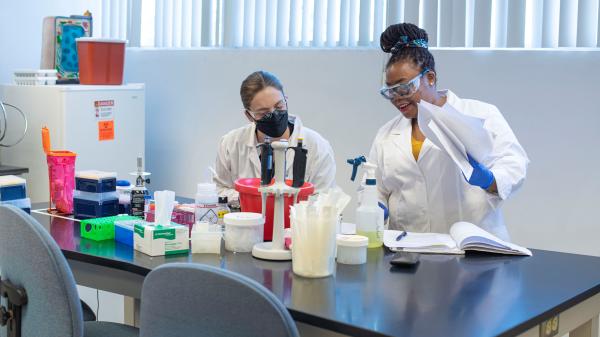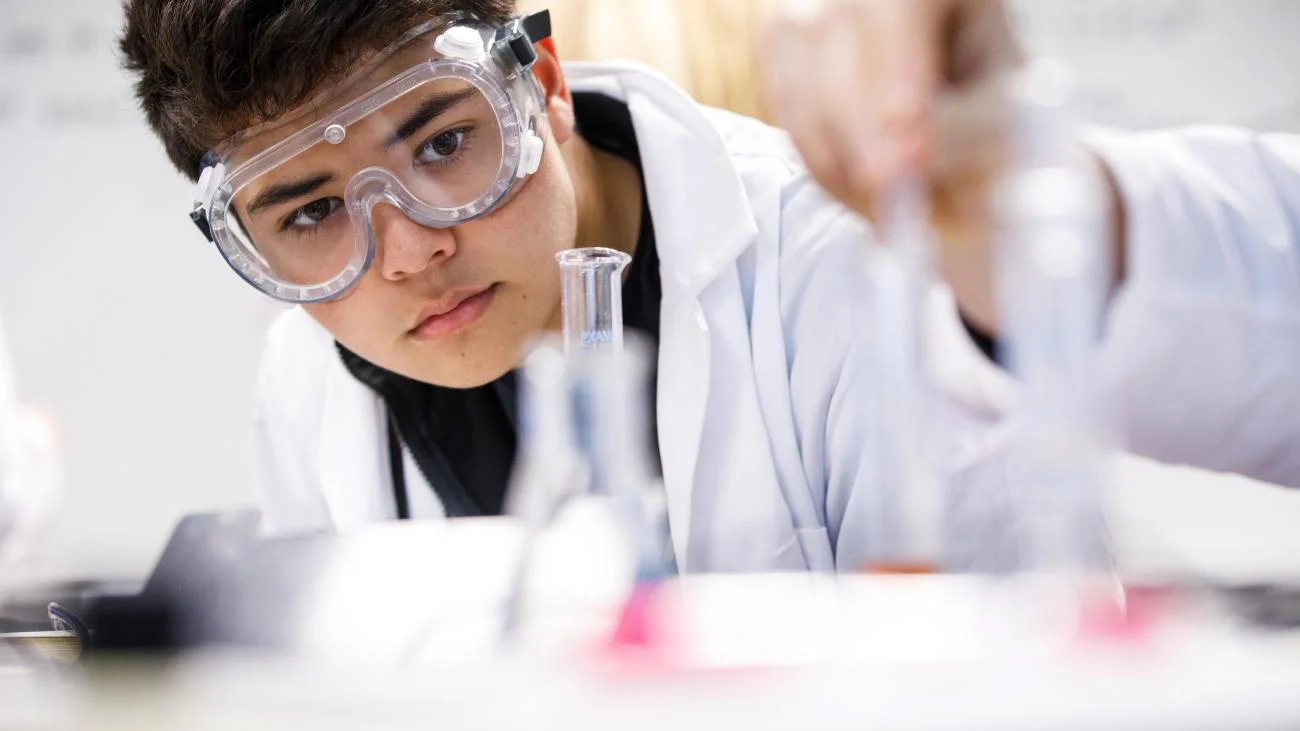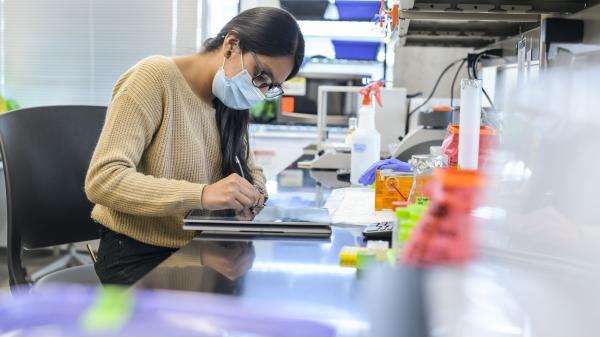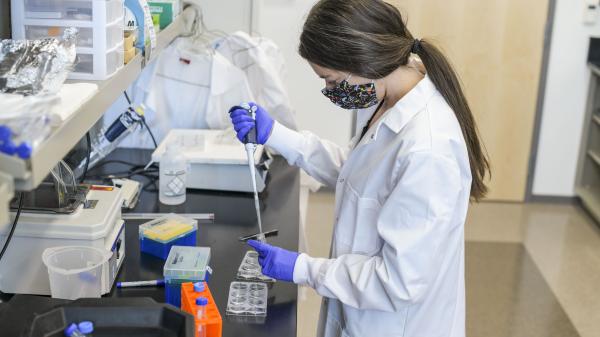The School of Life Sciences is dedicated to supporting undergraduate students in gaining learning experiences beyond the classroom.
Experiential learning within the life sciences includes the following:
- Undergraduate Research within labs at ASU or partners (the Phoenix Zoo, TGen, USDA, etc.)
- Course-based Undergraduate Research (CUREs) wherein entire classes of students participate in a semester-long research project investigating specific problems of interest to the scientific community (faculty, industry partners, non-profit organizations).
- Internships are professional experiences that are more work-related than research-based. These opportunities occur off-campus and provide students with career development and transferable skills.
What is a CURE?
(Course-based undergraduate research)
CUREs are undergraduate research opportunities open to entire classes of students. These students participate in a semester-long research project investigating specific problems of interest to the scientific community (faculty, industry partners, non-profit organizations).
Have a CURE you need advertised? Email Paula Baker, [email protected].
Want to develop a CURE or teach a pre-existing CURE? Email Christy Adams, [email protected] and Paula Baker [email protected].
How can my student get research credit via 495?
Students will need to:
- Receive approval from faculty to do research in lab
- Complete omnibus form.
After the student initiates the form, the faculty will then outline the requirement. Students acknowledge the requirements and signs the form. Students should have conversations with their faculty mentor about credit as soon as possible. As the student cannot receive retroactive credit, students will need to sign up for 495 before starting the work they’d like to receive credit for.
495 undergraduate research credit is optional.
How to advertise a research opening?
Have an opening for undergraduate researchers in your lab?
You can advertise using this form.
SOLUR posts open undergraduate research positions via Handshake when faculty members request it via this form. Many undergraduate students follow SOLUR on Handshake for these opportunities.
Once posted, the individual indicated via the Handshake form receives emails containing student applications. There is no need for the faculty or PI to access Handshake directly or create their own account.
Applications for your position will come via email. Clicking the link(s) at the bottom of the Handshake notification emails begins an automatic download of the application package(s).
Handshake is a great way for faculty to advertise open positions and receive the documentation they’ll need to decide who to interview.
Additionally, using Handshake is a move toward equity and inclusion, as students from some backgrounds might not know to reach out to professors and ask—or might not feel comfortable doing so because of their cultural background. However, they might feel more comfortable applying for a lab position if they know it is open.
What is an internship?
An internship is a short-term work experience offered by companies and other organizations for people, usually students, to get some entry-level exposure to a particular industry or field. It is as much of a learning experience as it is work.
Students are tasked with finding their own internship. The School of Life Sciences does not place students in internships or “match” students with potential sites.
How do students apply for internship credit (484)?
Directions for completing the internship application are on the internship website.
What about pre-health students/clinical internships?
Any internship involving clinical or patient care must be applied through the Office of Clinical Partnerships’ Pre-Health Internship Program.
Requirements
- 3.0 GPA
- Junior/Senior status
Applications open the semester prior to engagement and deadlines are not flexible.
School of Life Sciences Undergraduate Research (SOLUR)
The easiest way to think about SOLUR is as a supplemental experience to a student’s research experience in a lab or CURE. SOLUR supplements that experience by helping them develop research-related skills they need but might not be learning in the lab (scientific communication skills, career exploration, etc.). The SOLUR Program offers four levels of participation. Student growth within their research experiences are reflected as they move through the levels and show within their transcript via the different course numbers.
Students typically remain at each level for two semesters. Students interested in SOLUR Apprentice and SOLUR Researcher can submit an agreement/application form at any time, although the SOLUR Seminar is only offered in the fall and spring semesters. SOLUR Scholar and SOLUR Fellow applications open during the spring semester for the following academic year. Applications are competitive, as these levels come with a small stipend to offset living expenses as the student participates in research.
iSTEM SOLUR Prep
Students need to already have a lab affiliation in order to participate in the SOLUR program. For students who would like to prepare themselves for this experience, the SOLUR program created iSTEM SOLUR Prep.
While not exclusive, the program traditionally seeks to assist historically excluded groups, community college transfers, and those with low-GPAs prepare for undergraduate research experiences.
iSTEM SOLUR Prep hopes that offering a pre-research experience will help students understand what research is and how to engage in these opportunities. In the seminar we workshop resumes, practice interviewing techniques, and do hands-on lab experiments to familiarize students with common techniques.
Online Immersion Program
The Research Immersion Program for ASUOnline offers SOLS online students the opportunity to learn and practice some common molecular biology techniques in the framework of two authentic research projects in the area of population genetics.
Each semester, approximately fifteen (15) students travel from all over the United States to engage with their labs in person. For many students, this was their first experience in a lab. While students are responsible for their own travel and room/board, the SOLUR program sets aside some funds for laboratory equipment and materials.
If you have an online student in your lab who is interested in immersion week, please email Susan Holechek ([email protected]) and Paula Baker ([email protected]).
Were you asked to write a letter of recommendation?

- ASU does not offer committee letters for students applying to health profession programs like medical school, dental school, optometry school, and more. Individual letters offer admissions committees important perspectives about an applicant’s strengths, unique characteristics, and goals.
- An instructor will be asked to speak to an applicant’s academic or research background most often. Below, you can find helpful information on what to include in your letter depending on what program the applicant is applying to.
- The advice provided by the American Association of Medical Colleges will be helpful for guiding a letter for most professions.
Resources
- The Association of American Medical Colleges’ guidelines for writing a letter of recommendation for a medical school applicant.
- The Association of American Medical Colleges’ guidelines for submitting letters of recommendation
- The American Dental Education Association’s tips for writing an effective letter of evaluation


